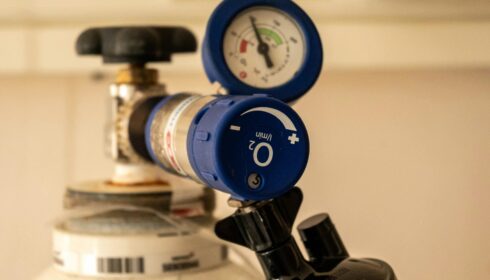HYPO-ECMO

Effect of Moderate Hypothermia vs Normothermia on 30-Day Mortality in Patients With Cardiogenic Shock Receiving Venoarterial Extracorporeal Membrane Oxygenation: The HYPO-ECMO study – A Randomized Clinical Trial
Levy et al | Journal of the American Medical Association | Feb 2022 DOI:10.1001/jama.2021.24776
Clinical Question
In patients with cardiogenic shock receiving venoarterial extracorporeal membrane oxygenation(VA-ECMO), does early use of moderate hypothermia (33-34°C) compared with strict normothermia (36-37 °C) improve 30 day mortality?
Background
- VA-ECMO is an increasingly common intervention for cardiogenic shock refractory to standard therapies
- Severe cardiogenic shock, especially in patients with associated cardiac arrest, may be associated with ischemia reperfusion injury
- Patients with refractory cardiogenic shock requiring VA-ECMO likely have most severe ischaemia reperfusion injury
- Moderate hypothermia
- May mitigate effects of ischemia reperfusion injury
- Well tolerated in patients after cardiac arrest / with cardiogenic shock
- However, not associated with significant change in haemodynamics or mortality
- Lack of data addressing hypothermia with ECMO – current recommendation is normothermia
- Rapid temperature control is easily achieved during ECMO treatment which may improve the effectiveness of moderate hypothermia
Design
- Multi-centre, unblinded, parallel-group randomised clinical trial
- Unblinded trial due to nature of intervention
- Study powered to 80% to detect a 15% relative reduction in the primary outcome (30-day mortality) using an estimated mortality of 50% in patients with cardiogenic shock supported by VA-ECMO
Setting
- Conducted in ICUs at 20 French cardiac shock care centres between October 2016 and July 2019
- Final follow-up occurred in November 2019
Population
Inclusion Criteria
- Endotracheal intubation
- Receiving VA-ECMO for cardiogenic shock for < 6 hours
Exclusion Criteria
-
- Younger than 18 years of age
- Pregnant
- VA-ECMO after cardiac surgery for a heart +/- lung transplant
- LVAD implantation
- VA-ECMO for acute poisoning with cardiotoxic drugs
- Uncontrolled bleeding (bleeding despite medical intervention with surgery or drugs)
- VA-ECMO after CPR > 45 minutes
- Out-of-hospital refractory cardiac arrest
- Already participating in interventional research
- Under guardianship
- Irreversible neurological injury
- No longer receiving life-sustaining therapies
786 patients assessed for eligibility after being intubated and treated with VA-ECMO
- 412 excluded
- Heart transplant or left ventricular assist device implantation (n=117)
- CPR >45 minutes (n=72)
- Uncontrolled bleeding (n=70)
- Moribund (n=53)
- Logistical reasons (n=42)
- Out-of-hospital refractory cardiac arrest (n=36)
- Poisoning (n=32)
- Family opposed to patient inclusion (n=26)
- 374 randomised
- 186 moderate hypothermia group
- 188 normothermia group
Baseline characteristics
Moderate hypothermia vs Normothermia – very similar between the two groups
- Median age: 57 vs 59
- Male: 76% vs 75%
- Cardiovascular history
- Cardiac arrest 48% vs 47%
- Hypertension 37% vs 37%
- Heart failure 20% vs 20%
- Ischaemic cardiomyopathy 19% vs 26%
- Myocardial infarction 16% vs 14%
- Valvular cardiomyopathy 13% vs 14%
- Aetiology of cardiogenic shock
- Acute coronary syndrome 35% vs 37%
- Ischaemic cardiomyopathy 23% vs 22%
- Rhythmic cardiomyopathy 17% vs 9%
- After cardiac surgery 14% vs 16%
- Acute myocarditis 10% vs 8%
- Dilated cardiomyopathy 9% vs 7%
- Pulmonary embolism 5% vs 5%
- Takotsubo syndrome 2% vs 4%
- Echocardiogram and laboratory results
- LVEF before VA-ECMO 20% vs 20%
- pH 7.32 vs 7.31
- Lactate 4.8 vs 4.9
- Sequential organ failure assessment score 10 vs 10
Intervention
- Hypothermia
- Target temperature of 33 °C to 34 °C achieved just after randomization by adjusting VA-ECMO circuit temperature controller for initial 24 hours
- Followed by progressive rewarming (0.1- 0.2 °C per hour) to 37 °C, and maintained at 37 °C for subsequent 72 hours
- 18 withdrew consent leaving 168 in primary outcome analysis
Control
- Normothermia
- Temperature maintained between 36 °C and 37 °C during first 24 hours and at 37 °C during subsequent 72 hours
- Among the patients who had a cardiac arrest, core temperature was strictly maintained at 36 °C
- 22 withdrew consent leaving 166 in primary outcome analysis
Management common to both groups
- VA-ECMO initiated per local practice with blood flow settings set to ensure adequate tissue perfusion
- Patients then randomized to moderate hypothermia or normothermia
- Further ICU therapy provided in accordance with generally accepted intensive care practices
Outcome
Primary Outcome
- Mortality at 30 days: no significant difference (42% vs 51%) with adjusted OR 0.71 (95% CI 0.45 – 1.13, p=0.15)
Secondary Outcomes
- Composite outcome of death, heart transplant, escalation to LVAD or stroke
- At 30 days: 52% vs 64%, OR 0.61 (95% CI 0.39 – 0.96) – statistically significant
- At 60 days: 58% vs 66%, OR 0.70 (95% CI 0.44 – 1.11)
- At 180 days: 61% vs 69%, OR 0.69 (95% CI 0.43 – 1.11)
- Mortality
- At 48 hours: 6% vs 7%, OR 0.98 (95% CI 0.38 – 2.51)
- At 7 days: 17% vs 28%, OR 0.53 (95% CI 0.31 – 0.93) – statistically significant
- At 60 days: 49% vs 55%, OR 0.79 (95% CI 0.50 – 1.25)
- At 180 days: 52% vs 58%, OR 0.81 (95% CI 0.51 – 1.29)
- Clinical Outcomes: No difference in any of the below
- VA-ECMO duration from randomisation
- Net intake of intravenous fluids at day 7
- Length of use of vasopressors
- Time to normalisation of lactate
- Number of days alive without organ failure at day 7
- Ventilator free days at day 30, 60 or 180
- Kidney replacement therapy free days at day 30, 60 or 180
- Length of stay in ICU or in hospital overall
Adverse Events
- Number of moderate and severe bleeding events was not different between groups
- Number of units of packed red blood cells transfused during VA-ECMO was higher in the moderate hypothermia group
- Number of nosocomial infections was not different between groups
Authors’ Conclusions
- In a mixed population of adults requiring VA-ECMO for refractory cardiogenic shock, early application of moderate hypothermia for 24 hours did not significantly increase survival compared with normothermia. However, the 95% confidence interval was wide and included a potentially important effect size, warranting further study
Strengths
- Well-designed, multi-centre study performed in the emergency setting
- Adequate randomisation with concealment
- No loss to follow up
- Standardised protocol for temperature regulation
- Similar baseline characteristics between groups
Weaknesses
- Patients with all cardiogenic shock aetiologies were included, leading to a degree of heterogeneity
- Potential for bias to due lack of blinding
- Strict inclusion and exclusion criteria – limits applicability of findings
- Trial was underpowered to statistically detect a survival benefit of <15%
- No sensitivity analysis excluding patients with cardiac arrest
- Individual component of the composite secondary outcome not reported
- Very large number of secondary outcomes without correction increasing risk of a false positive results
- Medium and long-term outcomes not evaluated, e.g. neurocognitive sequelae, which may have been clinically relevant
The Bottom Line
- Early moderate hypothermia for patients requiring VA-ECMO was not shown to reduce 30 day mortality
- The observed effect size could be clinically significant and warrants further investigation
- I would be interested to know if there was a difference in effect size between those with and without cardiac arrest
- For now I will continue to utilise normothermia for patients requiring VA-ECMO for refractory cardiogenic shock
External Links
Metadata
Summary author: Dinesh Giritharan
Summary date: 28th May 2022
Peer-review editor: Alastair Brown/Aidan Burrell
Picture by: Pexels: Blue Icebergs Under Cloud



